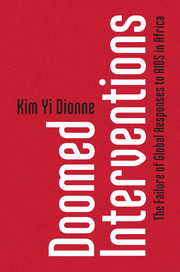Book contents
- Frontmatter
- Dedication
- Contents
- List of Figures
- List of Tables
- Acknowledgments
- 1 Misaligned Priorities: How Disconnect between Donors and Citizens Doomed AIDS Intervention in Africa
- 2 AIDS in Africa: A Significant Challenge and a Disconnected Response
- 3 Principal–Agent Problems and AIDS Interventions in Africa
- 4 AIDS in Malawi
- 5 Policy Priorities in the Time of AIDS
- 6 Seeing Like a Village: Headmen as Agents of the Global AIDS Intervention
- 7 Conclusion
- Bibliography
- Index
5 - Policy Priorities in the Time of AIDS
Published online by Cambridge University Press: 28 November 2017
- Frontmatter
- Dedication
- Contents
- List of Figures
- List of Tables
- Acknowledgments
- 1 Misaligned Priorities: How Disconnect between Donors and Citizens Doomed AIDS Intervention in Africa
- 2 AIDS in Africa: A Significant Challenge and a Disconnected Response
- 3 Principal–Agent Problems and AIDS Interventions in Africa
- 4 AIDS in Malawi
- 5 Policy Priorities in the Time of AIDS
- 6 Seeing Like a Village: Headmen as Agents of the Global AIDS Intervention
- 7 Conclusion
- Bibliography
- Index
Summary
Some problems can be forgotten if the assistance goes only to one side. We have other problems like boreholes. Hence this [AIDS] money could also go to other areas … People suffering from other diseases too should be helped.
Headman Interview #48, Mchinji District, July 10, 2008The success of international health and development interventions depends on how they are received by local populations. Judging from the scale of resources, international actors highly prioritize AIDS intervention. Little is known, however, about the policy priorities of the people in whose name powerful donors send assistance. This chapter examines empirically what is often overlooked: Africans’ attitudes about development and health interventions for which they are the intended beneficiaries. While it is true that Africa has suffered the most from AIDS, we cannot presume that HIV is the most important problem facing Africans.
Earlier chapters substantiated that AIDS is pandemic in Africa and presented an argument that the global AIDS intervention is plagued by principal–agent problems inherent in the multitiered intervention against AIDS in Africa. That argument relies on the assertion that policy preferences for AIDS intervention are misaligned. In this chapter, I empirically substantiate the misalignment of AIDS prioritization between two important constituencies: the international donors who largely decide global priorities and the people who are their intended beneficiaries.
The chapter is structured as follows: the first section details the prioritization of AIDS in the international community, primarily among powerful donors, using data on official development assistance (ODA). I then draw from existing scholarship to examine what shapes citizens’ policy preferences, and focus on two expectations: that people living with HIV (PLHIV) stand to benefit most from AIDS interventions and will thus give higher priority to AIDS; and that HIV-affected people – people related to and potentially caring for PLHIV – will also give AIDS higher priority. The next two sections analyze public opinion data, which substantiate ordinary Africans give relatively low priority to AIDS interventions and provide evidence that experience with HIV/AIDS makes people more likely to prioritize AIDS (even if only weakly). Then I explore alternative measures of AIDS prioritization and alternative explanations for low prioritization of AIDS by ordinary Africans. The chapter concludes with a discussion of some implications of the misalignment of priorities.
- Type
- Chapter
- Information
- Doomed InterventionsThe Failure of Global Responses to AIDS in Africa, pp. 101 - 125Publisher: Cambridge University PressPrint publication year: 2017



